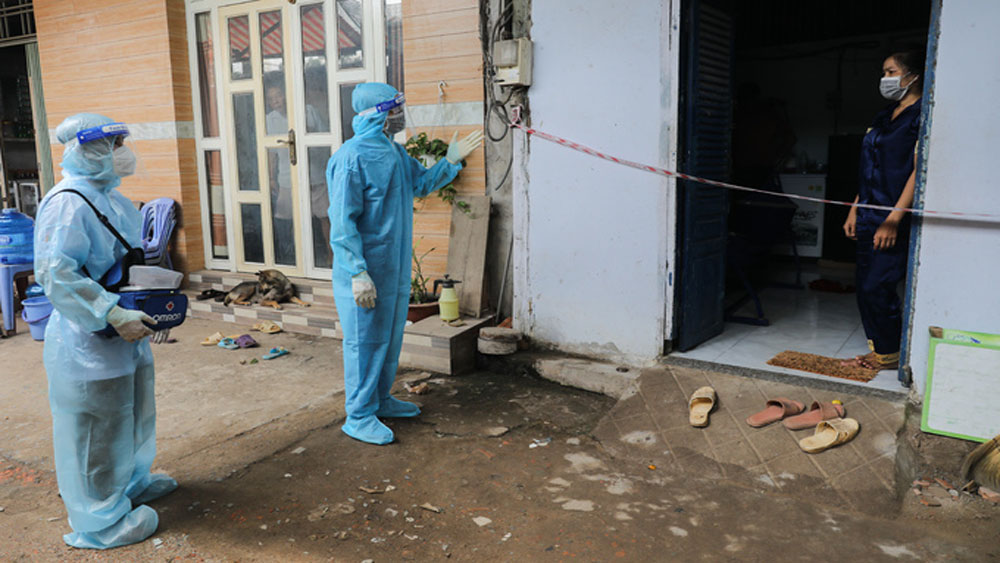Essentials for Covid self-isolation
Patients should stay in an airy space with windows and have separate restrooms that only use fans and no air conditioners.
On the list of basic items patients should prepare are personal toiletries, a separate trash can, electric fan, super speed kettle, masks, gloves, eating utensils, and detergent.
 |
|
Medics speak to a Covid-19 patient isolated herself at home in HCMC, August 29, 2021. |
Antipyretics, digestion drugs (including those for stomachache and diarrhea), sore throat remedies, oil for body pain, oresol, saline mouth rinse, nasal spray, vitamins (especially C and D3), thermometer, blood pressure monitor and blood oxygen monitor should also be at hand.
Covid-19 patients should expect fever, dry cough, fatigue, muscle pain, sore throat, runny nose, headache, vomiting, diarrhea, loss of smell, tongue numbness as possible initial symptoms.
When suffering fevers, patients should not lie down in one position for a long time but change position from time to time, or even sit up, every two hours.
If their temperature is above 38.5 degrees Celsius, use paracetamol. Adults can take a 0.5 gram pill, while children can be given 10-15 milligrams per kilogram of weight. It should be noted adults should not have more than 2 grams per day while children should not have more than 60 milligrams per kilo.
Normally, antipyretics are effective after around one hour, so patients should avoid using too much as overdose can affect the liver. Patients can take fever suppressants four to six hours apart depending on the type of medicine.
It is advised that patients do not arbitrarily use antibiotics, while all prescription drugs must be prescribed by a doctor.
For nutrition, patients should drink lots of warm water, add oresol to rehydrate, have garlic and lemon grass in daily meals, eat light, easy-to-digest food, have more fresh fruits and food that provides vitamin C. They should eat well yet not skip meals or eat too much either.
For physical exercise, patients could do it gently every day whenever they can, walk around as much as possible, and try to breathe deeply and evenly.
Patients should also have their pulses and breathing rates checked regularly.
Adult normally have a pulse of 60-90 beats per minutes so if it is higher than 100 or lower than 50, medical attention is needed.
Newborns have a pulse of 100-160 beats per minute; 0-5 months old 90-150 beats; 6-12 months old 80-140 beats; 1-3 years old 80-130 beats; 3-5 years old 80-120 beats; 6-10 years old 70-110 beats; 11-14 years old 60-105 beats; and 15-20 years old 60-100 beats.
While checking breathing rates, patients should be let to lie comfortably for 5-10 minutes, then count the number of times the chest rises and falls.
The normal adult breathing rate is 16-20 times a minute. Notify doctors if it is more than 22 or less than 15.
Children breathe faster than adults: newborns 30-50 times a minute; 0-5 months old 25-40 times; 6 months-5 years old 20-30 times; 6-10 years old 15-30 times; and children 11-20 years old 12-30 times.
|
"Medicine package for Covid-19 patients" campaign aims to support patients self-isolating at home. Each donation worth VND380,000 ($16.65) can help buy medicine for one patient. For more information regarding donation methods, kindly refer to this link. |
For blood oxygen (SpO2) measurements, if it is 94 percent or more, patients can continue to monitor three to four times a day to see if they are stable or not. Medical advice or hospitalization is required if it is higher than 90 percent but lower than 94 percent.
In case it is less than 90 percent, which is a sign of severe Covid-19 infection, medical attention should be offered as quickly as possible.
In case patients suffer breathing difficulties with shallow and noisy breaths, pulsating nostrils, discoloration of the lips, nails and skin, along with a cold feeling in the body's extremities, they must receive medical help.
It should be noted that children, people with underlying medical conditions, and the elderly should be kept away from Covid-19 patients.
Direct caregivers should wear protective gear, masks, and gloves while all medical waste should be disposed of separately.
Caregivers should wash their hands regularly, rinse their mouths, noses and throats with salt water aside from taking vitamins C, B1, B6, B12.
Source: VnExpress
 Bắc giang
Bắc giang












Reader's comments (0)